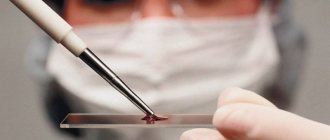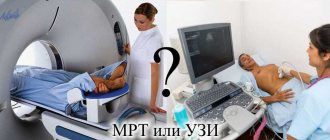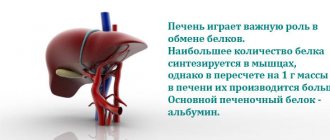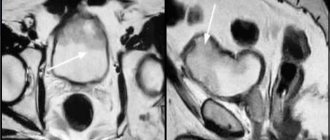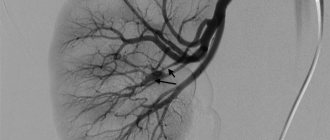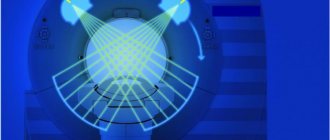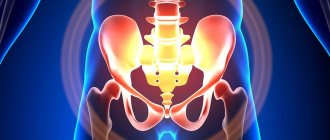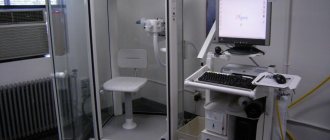MRI can be performed without a doctor's prescription
This is true.
The MRI machine does not have a harmful effect on human health, so the patient can apply for an MRI study himself if something bothers him, but he has not received a referral for the study from a doctor.
However, it is worth thinking about what is the point of conducting this research? To make a correct diagnosis, you need to accurately determine the area of study. For example, pain in the legs occurs for various reasons: diseases of the lumbar spine, hip joints, blood vessels, or diabetes mellitus.
Only the attending physician can determine the type and area of research after a careful examination and thorough analysis of the patient’s complaints. Without a doctor's direction, the patient may make a mistake and do the wrong test.
Before coming for a test without a doctor’s referral, we recommend weighing the pros and cons.
Pros:
- Most likely, nothing will be found out about you, and you will be able to calmly enjoy your life further.
- You will receive a research result that may be useful. If health problems arise in the future, taking pictures in a state of relative health will help doctors more accurately and quickly diagnose and prescribe treatment. Doctors will have the opportunity to compare images and track the dynamics of changes. For example, there are congenital characteristics that cannot always be accurately distinguished from diseases the first time. And if a doctor sees the same thing in a picture taken 10 years ago, then most likely these are not pathological changes, but congenital features.
- In very rare cases, the patient's concern is confirmed, and during the examination, serious diseases are found that require treatment.
Minuses:
- Most often, patients’ concerns are unfounded, and performing an MRI without a doctor’s referral makes no sense.
- Minor changes may be detected that are not clinically significant. But the very fact of their presence negatively affects the mood and sometimes the psyche of the patient. Instead of enjoying life, the patient falls into hypochondria, starts visiting all the doctors and taking unnecessary medications.
Is there a free MRI?
For people who cannot pay for the study or obtain insurance, public hospitals offer quotas. A certain number of people in the program receive MRIs free of charge, but only at the facility where the person is served. There are long queues for routine examinations. Only emergency patients who are referred by a doctor undergo nuclear magnetic resonance urgently.
There are free MRIs, but only for a certain category of patients. Quotas in clinics are several procedures per month. Low capacity creates queues. It is impossible to increase the number of services, since the equipment must pay for itself. Repair and maintenance are accompanied by large financial costs. State medical institutions on their own will not be able to provide high-quality operation, so the service must be paid for.
If you wish, you can get an MRI for free in the following situations:
- The service is included in the list of diagnostics of health insurance;
- Performed according to a quota in a clinic or hospital;
- For a promotion in a private clinic.
Quotas are allocated by doctors to patients who really need a scan and have a waiting list of more than a month. Directions are required to complete.
By law, anyone has the right to undergo a free magnetic resonance imaging scan. The implementation of the condition is carried out in turn. In MSC and St. Petersburg, sometimes you have to wait more than half a year.
If you have a headache, you should definitely do an MRI of the brain.
Most often, patients who are bothered by headaches come for MRI of the brain. But in 80% of cases it is a tension headache associated with stress, fatigue, neck muscle tension, scalp tension, etc. None of this can be seen on an MRI. Such patients turn out to be healthy from an organic point of view: they have no changes in the substance of the brain. And their headaches should be treated by neurologists and cephalologists. Using MRI, you can exclude possible tumors, strokes, developmental features, anomalies, etc., but finding and treating the cause of the headache is the task of other specialists.
Where and who gives a referral for an MRI?
Considering the technological complexity of the MRI process, it is extremely rare for a person without special medical education to correctly assess the area of the upcoming examination, as well as determine the required type of MRI (with or without contrast, comprehensive or targeted examination), therefore the intervention of a clinician of the appropriate specialization is mandatory for the benefit of health patient.
A referral form for MRI is available in any medical institution, both public and commercial, and is filled out by a clinician after examining the patient, if this examination is necessary.
An MRI machine is a confined space
Typically, patients are worried before the test because they are afraid of being in a confined space. In fact, an MRI machine is a kind of pipe where there is air, fans, lighting and communication with a doctor. Once the patient is there, he realizes that he is in an open space and his fear disappears.
There are certain groups of people, for example, combatants, with whose claustrophobia nothing can be done. For such patients, we offer another imaging method: computed tomography or open tomography.
Who decrypts the pictures?
The examination is carried out by an x-ray technician, and the images are interpreted by a radiologist. A doctor in this specialty reads MRI, CT and X-ray data.
Then the doctor writes a conclusion indicating the presence or absence of pathological changes. If a disease is suspected, the nature of the changes and the characteristics of the affected organ or part thereof are described in detail.
Photo of a healthy person
On average, decoding takes a couple of days; in private clinics you can get the result in 0.5-2 hours.
MRI is harmful to health
The operating principle of the device is based on magnetic fields, and the research process is safe from the point of view of ionizing radiation - it is absent . There is simply no harmful radiation. Unpleasant sensations during the examination are caused by the need to lie still, sometimes for quite a long time. But for the sake of your health, it’s worth being patient, because MRI is one of the most informative methods for studying and diagnosing diseases of the central nervous system, human musculoskeletal and joint systems, etc., which means it helps to make an accurate diagnosis and prescribe the correct treatment.
Which doctor should I contact for an MRI of the spine?
Spinal diseases are dealt with by a general practitioner upon initial treatment. The doctor will analyze the patient’s condition, issue a referral for laboratory blood tests, and prescribe clinical and instrumental methods. Making a diagnosis of vertebrogenic lumbargia, osteochondrosis, suspicion of intervertebral hernia or protrusion requires consultation with a neurologist. If a specialist needs information about the condition of the spinal column, a good doctor will refer you for an examination. A high-quality MRI image of the joint is possible with the patient in a stationary position.
Tomography is done at an early stage to select treatment tactics and prevent consequences from the musculoskeletal system. Damage to the spine can be combined with compression of the spinal cord. The condition causes disability due to failure of the muscles of the lower extremities.
Which doctor should I go to after a neurologist? After receiving the referral, you need to consult a specialist in CT or MRI (depending on the type of examination).
Planning a procedure with contrast requires the exclusion of allergic reactions to gadolinium. By means of a provocative test, the body's reaction to the paramagnetic agent is determined. The study is carried out only if there are no changes in the patient’s health.
The contrast agent has many side effects
Sometimes, for research, patients are given an intravenous drug containing the metal gadolinium. It helps to better visualize certain structures; by the accumulation of this drug in tissues, you can track the presence of tumors, their prevalence, etc. This drug is much safer than the one used in computed tomography. The risk of an allergic reaction is minimal.
The contrast agent, like all medications, has possible side effects, but in general it is hypoallergenic, well tolerated by patients, and most importantly, it increases the accuracy of diagnosis.
The administration of such a drug may be contraindicated only in patients with renal failure, who must notify the doctor about their disease. In such cases, the patient will first have to take a blood test, based on the results of which a decision will be made on whether to administer the drug.
Is it difficult to train as an MRI specialist?
To become a doctor who takes and interprets MRIs, you need to graduate from a medical school and complete an internship in radiology. Studying takes 6 years at the institute and 1 year of specialization.
If you have a medical education and are a practicing doctor, take courses at a medical university - they are paid, and the study takes several months. Check with the continuing education department about retraining.
MRI is performed upon the referral of any doctor if indicated or for a fee on one’s own initiative. If your insurance company pays for a CT scan, fill out the necessary paperwork and get in line.
The images are interpreted by a radiologist, and the final diagnosis is made by the attending doctor who wrote the referral.
The presence of any metal implants is a contraindication for MRI
The only absolute contraindication to MRI is the presence of a pacemaker or cochlear implant. The presence in the patient's body of metal prostheses and implants, plates, surgical staples, vena cava filters, stents, dental pins, braces and other metal objects is not a contraindication to MRI.
Conducting research is possible. Difficulties may arise with visualizing tissues and organs around a metal object, but this does not pose a danger to the life and health of the patient. It is necessary to inform the doctor about the presence of metal in the body, but conducting a study is most likely possible.
Features of MRI
The basis of magnetic resonance imaging is a magnetic field that affects the hydrogen atoms of body tissues. From such contact, the waves change, are captured by the tomograph sensors, and are transformed into an image.
After the study, high-quality images are obtained, which are used to evaluate:
- organ size, boundaries;
- parenchyma condition;
- edema, tumors, foreign bodies;
- functional disorders, degree of blood flow and lymph circulation.
To improve the quality of the study, contrast is sometimes introduced. This is a special substance that colors tissues and improves their appearance in the picture.
The scan does not cause radiation, but there is a list of contraindications, the most serious being the 1st and 3rd trimesters of pregnancy, electronic devices in the body and metal implants.
Who is prescribed a tomography and is it possible to do such an examination at will?
In diagnosing coronavirus, computed tomography has almost 100 percent accuracy. Now, if coronavirus pneumonia is suspected, treatment is prescribed without waiting for test results, but on the basis of CT scan and clinical signs
Photo: Sergey Krasnoukhov/TASS
Russian opera singer Svetlana Kasyan about two weeks ago met in church with a friend who was infected with the coronavirus, but did not know about it. And although the meeting was short, it was enough, says Svetlana. A few days later the disease manifested itself:
Svetlana Kasyan, opera singer “I felt bad, I had a cough and chest pain, body aches that I could neither sleep, nor stand, nor move. I was immediately sent for a CT scan of my lungs. And there it instantly showed double pneumonia, damage to absolutely all segments. At the hospital, the doctors immediately said that there is now a big problem with the tests, a huge number of false negative and false positive tests, so they do not rely on the test results. They took five tests from me, and I received the result only after two weeks.”
Now patients are being treated without waiting for test results, but based on clinical manifestations and computed tomography - it is performed on all those admitted to hospitals with suspected pneumonia. The tomogram shows changes that are characteristic specifically of COVID-19: compaction of the lung tissue like “frosted glass.” This also occurs with other viral pneumonias, but with the new coronavirus, both lungs are more often affected and over a wide area. In Moscow, specialized hospitals are provided with CT machines, and there are no major delays in examinations, says Alexander Vanyukov, head of the X-ray surgery department of the 52nd hospital, which is currently treating patients with COVID-19 .
— There is a temporary funnel there, since one device can only pass a limited number per day. Now all large hospitals have CT machines, often two or three. There are no problems with the examination now. Maybe if 20-30 people arrive at the same time, there will be a delay, but this is several hours, this is not such a fundamental story.
— How often does it happen that a coronavirus test is negative, but a CT scan confirms that a person has COVID-19?
— It happens that the smear is taken poorly or the sensitivity of the test is limited. The second or third test will most likely be positive. The first one can easily be negative; about 30% of negative tests then turn into COVID-19.
The examination is included in compulsory medical insurance; you do not need to pay for it separately. According to Alexander Vanyukov, CT scans are performed even on foreigners without insurance if they are admitted by ambulance. In addition, 42 Moscow clinics were equipped with CT machines, where examination can be done on an outpatient basis. The procedure is prescribed by a doctor; it is carried out strictly by appointment in order to prevent potential patients from congregating in queues. And although the sensitivity of CT is up to 98%, it is not prescribed to everyone. Patients with mild forms of COVID-19 - and 80% of them - do not need this, says Sergei Morozov, a specialist in radiation and instrumental diagnostics of the Moscow Department of Health.
Sergey Morozov, specialist in radiation and instrumental diagnostics of the Moscow Department of Health “In the case of a mild disease, whether a CT scan is performed or not, the treatment will not change. If the temperature remains stably high, above 38.5, if respiratory failure occurs, then you should consult a doctor. But everyone asked: “I have a fever, what if I have coronavirus?” - there is no point in running to the clinic with this, because, on the contrary, the person can become even more seriously ill. In the clinic, when you interact with other patients, you have a higher risk of receiving a large infectious dose of the virus, plus you can infect others. This is under no circumstances acceptable."
In addition, in the initial stages of the disease there may be no changes in the lungs, and CT scans cannot be performed every day. However, there will always be patients who do not trust free doctors and go to paid clinics. There, a chest CT scan costs from three thousand to 18 thousand rubles. But this is a matter of choice.
The increase in the number of people infected with coronavirus in Moscow was the result of the relaxed behavior of city residents over the past ten days, WHO representative in Russia Melita Vuinovich said in the “Sunday Evening” program on the Rossiya 1 TV channel. According to her, the number of cases is growing very quickly. “Unfortunately, the good weather and the relaxation because the numbers weren’t as high allowed people to think, ‘Well, this doesn’t concern me,’” Vujnovic said.
Add BFM.ru to your news sources?
